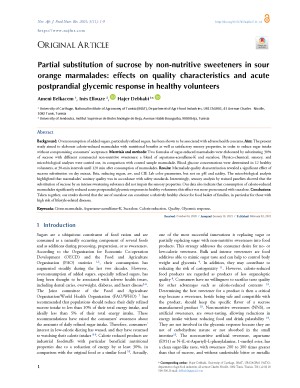Main Article Content
Partial substitution of sucrose by non-nutritive sweeteners in sour orange marmalades: effects on quality characteristics and acute postprandial glycemic response in healthy volunteers
Abstract
Background: Overconsumption of added sugars, particularly refined sugars, has been shown to be associated with adverse health concerns. Aim: The present study aimed to elaborate calorie-reduced marmalades with nutritional benefits as well as satisfactory sensory properties, in order to reduce sugar intake without compromising consumers' acceptance. Materials and methods: Two formulas of sugar-reduced marmalades were elaborated by substituting 30% of sucrose with different commercial non-nutritive sweeteners: a blend of aspartame-acesulfame-K and sucralose. Physico-chemical, sensory, and microbiological analyses were carried out, in comparison with control sample marmalade. Blood glucose concentrations were determined in 12 healthy volunteers, at 30-min intervals until 120 min after consumption of marmalades. Results: Marmalade quality characterization revealed a significant effect of sucrose substitution on dry extract, Brix, reducing sugars, aw, and CIE Lab color parameters, but not on pH and acidity. The microbiological analysis highlighted that marmalades’ sanitary quality was in accordance with safety standards. Interestingly, sensory analysis by trained panelists showed that the substitution of sucrose by an intense sweetening substance did not impair the sensory properties. Our data also indicate that consumption of calorie-reduced marmalades significantly reduced acute postprandial glycemic responses in healthy volunteers; this effect was more pronounced with sucralose. Conclusions: Taken together, our results showed that the use of sucralose can constitute a relatively healthy choice for food basket of families, in particular for those with high risk of lifestyle-related diseases.







